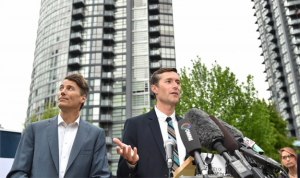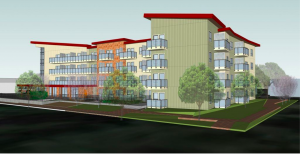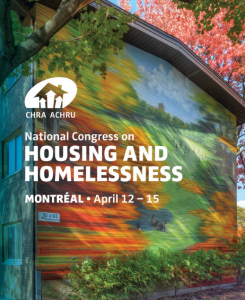Vancouver Mayor Gregor Robertson is offering $250-million worth of city-owned property as part of an ambitious prebudget pitch to the federal government for new affordable-housing cash.
The 20 sites put forward by the city are largely concentrated in areas of new development, such as the north shore of False Creek and the southeast corner of the city in an area called East Fraserlands, as well as in the Downtown Eastside. Most of the properties are vacant lots.
The federal Liberals are just weeks away from releasing their first budget and have clearly signalled that social housing is a priority for infrastructure spending, particularly because construction and its associated stimulus impacts can occur quickly at a time when the Canadian economy is struggling.
The proposal from Vancouver, the largest offer of municipal land ever made by the city, is aimed at attracting $500-million in federal housing money over five years. The city is also asking the B.C. government to contribute.
Vancouver is not directly responsible for managing and adding to the large stock of social housing in the city. In B.C., the provincial government is primarily responsible for social housing.
Mr. Robertson will be among 19 of Canada’s big-city mayors who are meeting in Ottawa this week to make their prebudget pitches directly to federal cabinet ministers as part of a formal gathering of the mayors’ caucus, organized by the Federation of Canadian Municipalities, that’s set for Thursday and Friday.
In a sign of Ottawa’s interest, the Prime Minister is expected to meet the mayors, as will Finance Minister Bill Morneau, Infrastructure Minister Amarjeet Sohi, Immigration Minister John McCallum, Indigenous and Northern Affairs Minister Carolyn Bennett, Environment Minister Catherine McKenna, and Public Safety Minister Ralph Goodale.
The Liberals are promising to spend $60-billion in new infrastructure cash over the next 10 years, split evenly between public transit, social infrastructure and green infrastructure. The agenda of the mayors’ two-day meeting is focused on the federal budget and climate change, which is a sign that cities are trying to craft their infrastructure requests so they can tap into all three sources of cash.
While cities have long warned that the demand for affordable housing far exceeds supply, mayors are clearly preparing their pitches to fit with two of the federal government’s more pressing priorities: boosting economic growth and finding homes for thousands of new Syrian refugees.
“Particularly with the economic wobble, we’ve looked at opportunities to create as many jobs as possible,” Mr. Robertson said in an interview. The mayor said his proposal should create up to 9,000 jobs over five years. “It is geared for putting people to work building affordable housing and responding to the government’s concerns on the economy,” he said.
B.C. Housing Minister Rich Coleman, who will also be in Ottawa this week, declined to respond Monday on whether the province would consider contributing to the plan.
The Vancouver Affordable Housing Agency has contractors lined up to start work and the city estimates the plan would create 3,500 affordable-housing units, with the potential to start construction on 500 of those units this year.
Toronto Mayor John Tory will be making a similar request during his visit to Ottawa. Toronto announced a plan in November that would open up five sites for affordable-housing development in the short term and a further 13 sites for future development.
In an interview, Mr. Tory said he would like Ottawa to free up federally owned land in the city for affordable housing and provide extra cash for new builds and renovations of existing housing. The mayor said his own discussions with Prime Minister Justin Trudeau have been “very encouraging” on this file.
He also said the mayors will want to discuss how to house the influx of refugees, who require housing that is separate from the existing stock of affordable housing.
“Our social housing has a long waiting list for it already,” he said in explaining why that is not an option in Toronto, where many Syrian refugees are arriving. “We’re having to find other answers and I guess that’s what makes it complicated, because the other answers aren’t simple to come up with,” he said. “Housing is going to be one of the most important determinants of whether we can settle these refugees effectively as soon as possible.”
Mr. Robertson and his Vision Vancouver party have aggressively worked to increase the amount of shelter space and social housing since first being elected in 2008.
Many Vancouver city councils over the years have encouraged the province to invest by providing sites. But Mr. Robertson’s council has gone beyond that recently by buying some hotels outright to be used for housing.
As well, three years ago, it contributed $22-million worth of land on four sites for an innovative project being undertaken by a group of nonprofits and co-ops that are about to start construction on 355 units of housing.
The Social Housing Alliance in B.C. estimates that at least 116,000 people in the province are in a housing crisis, including 11,000 who are visibly homeless, 40,000 who are among the “hidden homeless” by living temporarily with friends, family or in cars and a further 65,000 who are at risk of homelessness because they spend more than 50 per cent of their income on rent.




 This is a one of kind event, providing an exceptional opportunity to learn, network and engage with a growing body of Canadian and international practitioners, policy makers, front line workers, government officials and key stakeholders from across the affordable housing and homelessness sector.
This is a one of kind event, providing an exceptional opportunity to learn, network and engage with a growing body of Canadian and international practitioners, policy makers, front line workers, government officials and key stakeholders from across the affordable housing and homelessness sector.